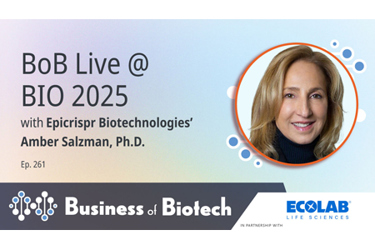Epic Bio's Big Swing In Epigenetic Editing

By Ben Comer, Chief Editor, Life Science Leader

The Business of Biotech was taped in front of a live audience in Boston during the BIO conference last month, and we couldn’t have asked for a better guest to test out this new format. Amber Salzman, Ph.D., CEO of Epicrispr Biotechnologies (Epic Bio) regaled the audience with insights into the company's development of a new and novel drug modality — epigenetic editing — in spite of a challenging funding landscape. Epic Bio is at the bleeding edge of epigenetic modulation to treat complex diseases, and for Salzman, the mission is personal.
Salzman began her career at GSK, and was profoundly impacted by a rare neurodegenerative disease in her family. That personal urgency fueled the drive to address unmet needs in rare diseases, ultimately leading her to Epic Bio. The company's development work in Facioscapulohumeral muscular dystrophy (FSHD) — an epigenetic disease relevant to her family experience — deeply resonated. Under her leadership, the Epic Bio team scored an IND clearance for a brand new modality in just over three years. Lightning speed by industry standards.
CRISPR Vs. Epigenetic Editing
Epic Bio’s core epigenetic editing technology is different from traditional CRISPR editing. While DNA sequences remain constant, the epigenome dictates their expression. Unlike CRISPR, which cuts DNA, Epic Bio's approach uses the Cas molecule to precisely bind to DNA, but with a deactivated nucleus, so that no DNA cutting occurs. Instead, a gene regulator is fused to the Cas molecule, instructing DNA to control protein expression, either up or down. This method is significantly safer than traditional CRISPR because it avoids the risk of genomic instability associated with DNA cutting, but still allows for specific modulation.
Epic Bio's ability to raise $68 million in a Series B last March, despite the tough funding environment, proves that dollars are still out there for promising new science. Salzman noted that investors now demand to see platforms applied to specific indications, with excellent preclinical data, not just abstract hype. Importantly, the company has been "super capital efficient," and focused on "quickly and safely getting a transformational new medicine out there." Fundraising success was due to persistent engagement, which included "kissing a lot of frogs" and connecting with numerous investors until finding people with the guts to invest in early-stage innovation.
The company's lead candidate, EPI 321, targets FSHD, a debilitating progressive muscular dystrophy that severely impacts patients' quality of life. To help measure treatment efficacy, Epic Bio formed an AI partnership with Springbok Analytics. This collaboration uses MRI muscle imaging and natural history data to analyze muscle fat fraction and inflammation images, correlated with changes in functional outcomes. The goal is a "digital twin" concept, offering robust, measurable evidence for regulators.
Working With FDA
Engaging with the FDA for a new drug modality requires a bold, evidence-based approach. Salzman advises biotechs to "follow the data, follow the science," and advocate for scientifically sound results. For FSHD, Epic Bio proposed using methylation data as a biomarker, since increased methylation correlates with reduced disease severity. While the FDA agreed with the correlation, they encouraged human studies to prove that changing methylation directly alters the course of disease. Salzman is optimistic regarding the current FDA, and praised Commissioner Martin Makary’s constructive ideas for streamlining submissions and embracing innovative tools like AI.
Manufacturing for Epic Bio's novel therapy was meticulously planned with "quality by design" from the outset, said Salzman. The company’s process development lead, Dipali Patel, Ph.D., was instrumental in forging a strong, collaborative partnership with their CDMO. Salzman emphasized the importance of treating a CDMO partner as "part of the team," which, combined with Patel's proactive approach, led to a rapid production scale-up to 1,000-liter bioreactors for Epic’s clinical trial.
Looking forward, Salzman’s priorities include the successful progression of its FSHD clinical trial, advancing other pipeline indications, and — as always for early-stage biotechs — securing further funding. With FSHD being a "fairly common rare disease" with significant commercial potential, Salzman believes Epic Bio is well-positioned to deliver transformative new medicines to patients in need.
